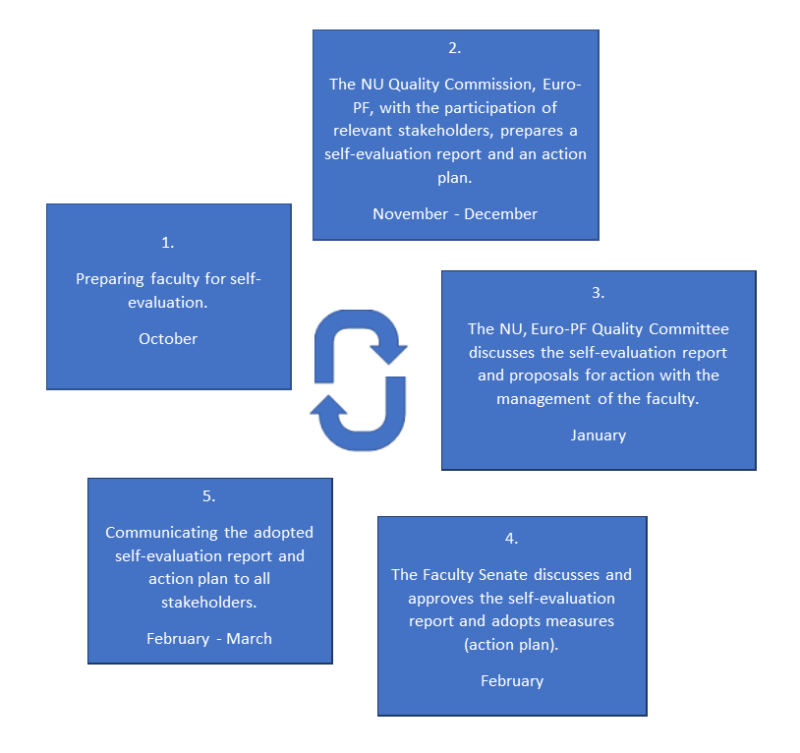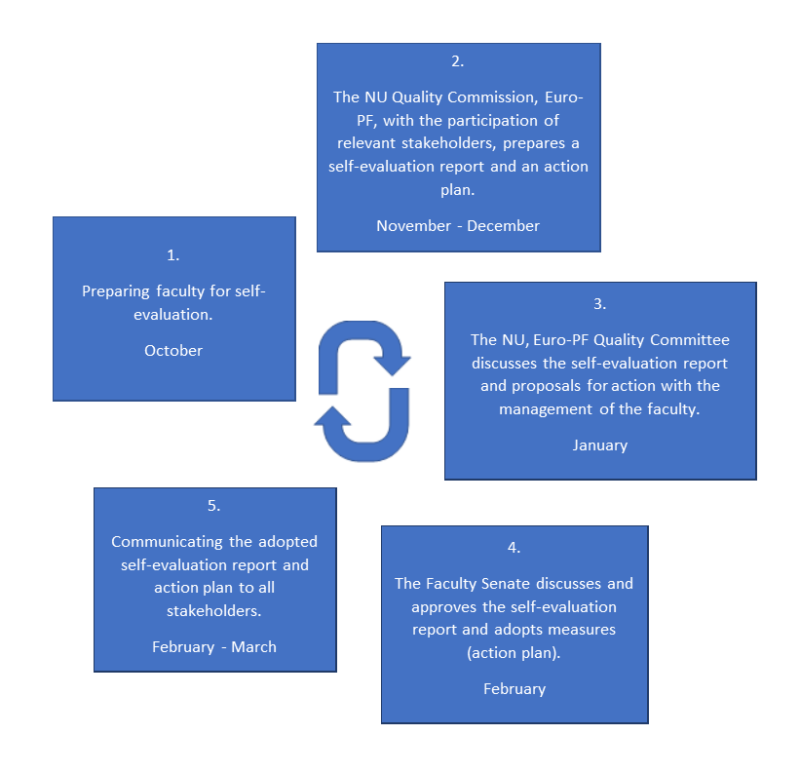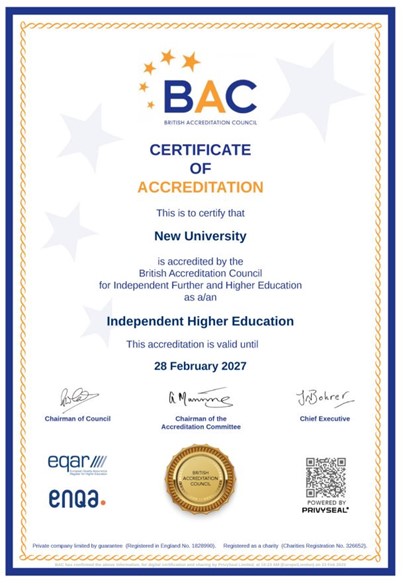- Home
- >
- Faculty
- >
- About the faculty
- >
- Quality
Quality
Quality
The New University, European Faculty of Law continuously monitors, promotes and ensures the development and progress of the internal quality system in all areas of its activities through various procedures and activities. All undergraduate and postgraduate study programmes run by the Faculty are accredited in accordance with the national Criteria for Accreditation and External Evaluation of Higher Education Institutions and Study Programmes.
The planning of self-evaluation at the Faculty is reflected in the Quality Regulations of the New University, which regulates the system of monitoring, evaluation and quality assurance with the aim of quality planning, organisation, operation and development of all its activities as defined in the vision, mission and goals of the New University, as well as the resources to achieve the set short-term and strategic goals of the University. The action plan for the forthcoming self-evaluation period is reflected in the Faculty’s Action Plan.
The purpose of the self-evaluation is to ensure the quality of planning, organisation, operation and development of all activities of the Faculty, as defined in the vision, mission and objectives, and of the resources to achieve the short-term and strategic objectives of the Faculty.
The quality of the Faculty is monitored by two Commissions, namely the Commission for Faculty Quality and the Commission for Quality and Evaluation of the New University, which include all key stakeholders representing specific areas or activities, namely: staff, students and the external environment (e.g. alumni, employers). The Commissions work together to make suggestions, highlighting areas that need special attention in the future and proposing appropriate measures to improve performance.
The quality system is based on the Deming circle model (PDCA): planning (Plan-P), implementation (Do – D), check (Check – C) and action (Act – A).
The quality feedback loop reflects the operating model described above, with a focus on continuous process improvement, which is then used as input for the new operating cycle of the quality system itself. The quality check, or the so-called closing of the quality loop, takes place in two stages, at faculty level and at university level.
The members of the Commission for Quality of the European Faculty of Law of the New University for the period until 31 October 2024 are:
- prof. dr. Marko Novak, researcher (president)
- izr. prof. dr. Boštjan Kerbler, Higher education teacher
- Neja Marc, student
- Nika Blaznik, Main Secretary
- Andreja Friškovec,
- Suzana Dejić, Head of Department for Student and Academic Affairs
- Inga Pikl, Head of the New University Centre for Career Development and International Mobility
- Nataša Kolavčič, International Mobility
- Sanja Stepanović, UKNU
- Marjana Perme, Accounting
- Doris Horvat, Promotion Adviser
- Jure Švigelj, odvetnik, Employers’ representative
- dr. Petja Mihelič, Alumni representative
FACULTY SELF-EVALUATION
PROCESSOGRAM – Faculty self-evaluation

Preparation of the NU member for the self-evaluation of the study program (1)
The expert associate in the field of quality prepares and collects all relevant material for the preparation of a self-evaluation report (survey analyses, data from the VIS, etc.), and distributes them to the members of the Member’s Quality Committee.
The Quality Committee meets and, on the basis of the material received, makes organisational preparations for the self-evaluation of each study programme.
Time frame: October
Preparation of the report (2)
The Quality Committee, with the participation of relevant stakeholders, in particular staff, students, management and the external environment (including employers, service providers, alumni, etc.), prepares a self-evaluation report for the study programme and an action plan.
Time frame: November-December
Consideration of the report (3)
The Quality Committee, in cooperation with the other committees and the Member State’s management, discusses the self-evaluation report of each study programme and the proposals for action (Action Plan).
Time frame: January
Report Confirmation (4)
The Senate of the member New University (NU) considers and approves the self-evaluation report of the study programs together with the proposals for action (Action Plan).
Time frame: February
Informing stakeholders (5)
The Member State of the New University (NU) shall inform stakeholders, in particular staff, students and representatives of the external environment (including employers, service providers, alumni, etc.), of the adopted self-evaluation report and action plan.
Time frame: February and, if necessary, additionally during the year
PROGRAMME EVALUATION
PROCESOGRAM – Self-evaluation of study programmes

1. Preparing faculty for self-evaluation
The implementation of the Programme Action Plan for the previous academic year is reviewed and the findings are taken into account in the preparation of the Self-Evaluation Reports of the study programmes and the new Programme Action Plan.
Timeframe: October
The Faculty prepares and collects all relevant material for the elaboration of the Self-Evaluation Reports of the study programmes (analysis of opinion surveys, VIS data, annual interviews, staff evaluations, document analysis, etc.).
On the basis of the material received, the Faculty, together with the NU Quality Commission, Euro-PF, shall prepare organisationally for the self-evaluation of the study programmes.
Timeframe: October
2. Preparation of the report
The Quality Committee, with the participation of relevant stakeholders, in particular staff, students, management and the external environment (including employers, service providers, alumni, etc.), prepares the Self-Evaluation Reports of the study programmes and the Programme Action Plan.
Timeframe: November – December
3. Consideration of the report
The NU, Euro-PF Quality Committee discusses the Self-Evaluation Reports of the study programmes and the proposals for action (Programme Action Plan) with the management of the faculty.
Timeframe: January
4. Validation of the report
The Faculty Senate considers and approves the Self-Evaluation Reports of the study programmes together with the proposals for action (Programme Action Plan).
Timeframe: February
5. Communication to stakeholders
The Faculty shall inform stakeholders, in particular staff, students and representatives of the external environment (including employers, service providers, alumni, etc.), of the adopted Self-Evaluation Reports of the study programmes and the Programme Action Plan.
Timeframe: February, and additionally during the year if necessary
Self-assessment reports
Samoevalvacijsko poročilo NU, Evro-PF za študijsko leto 2021/22
Samoevalvacijsko poročilo o izvajanju obvezne prakse na NU, Evro-PF v študijskem letu 2021-22
Pravo 1 – programska evalvacija – 2021-2022
Pravo 2 – programska evalvacija – 2021-2022
Pravo 3 – programska evalvacija – 2021-2022
CGP 2 – programska evalvacija – 2021-2022
PMIN 1 – programska evalvacija – 2021-22
PMN 2 – programska evalvacija – 2021-2022
Action plans
Akcijski načrt za uresničitev vizije in poslanstva NU, EVRO-PF 2022-23
Akcijski načrt za uresničitev vizije in poslanstva NU, EVRO-PF 2021-22
Akcijski načrt za uresničitev vizije in poslanstva NU, EVRO-PF 2020-21
Akcijski načrt za uresničitev vizije in poslanstva NU, EVRO-PF 2019_2020
Akcijski načrt za uresničitev vizije in poslanstva NU, EVRO-PF 2018_2019
Akcijski načrt za uresničitev vizije in poslanstva NU, EVRO-PF 2017_2018
Akcijski načrt za uresničitev vizije in poslanstva NU, EVRO-PF 2016_2017
Akcijski načrt za uresničitev vizije in poslanstva NU, EVRO-PF 2015_2016
Akcijski načrt za uresničitev vizije in poslanstva NU, EVRO-PF 2014_2015
Akcijski načrt za uresničitev vizije in poslanstva NU, EVRO-PF 2013_2014
Akcijski načrt za uresničitev vizije in poslanstva NU, EVRO-PF 2012_2013
National evaluations and accreditations
The European Faculty of Law of the New University (NU, Euro-PF) ensures and promotes the quality system through, among other things, national and international institutional and programme accreditation and evaluation processes. Participation in accreditation and evaluation procedures is monitored by the Faculty Secretariat and the NU, Euro-PF Quality Committee. The procedures are conducted at two levels, namely at the level of the study programme and at the level of the university as a whole. At the level of the study programme, an evaluation of a sample of study programmes is carried out annually and every five years in the process of renewal of the university’s accreditation.
EVALUATION OF A SAMPLE OF STUDY PROGRAMMES
The evaluation of a sample of study programmes is intended to advise the faculty in developing self-evaluation of study programmes and quality improvement. The Council of the National Agency for Quality in Higher Education (NAKVIS) determines the sample of the study programme evaluation, the process of which is carried out by a compulsory visit of a group of experts.
In 2019, NAKVIS carried out a sample evaluation of the 1st cycle study programme Law and Management of Real Estate and Infrastructure. The Commission did not detect any non-compliance, but based on the findings, it suggested certain improvements, which were taken into account by the Faculty, discussed and included in the Action Plan for the Realisation of the NU, Euro-PF Vision and Mission and implemented.
International evaluations and accreditations
New University is the first higher education institution in the Republic of Slovenia to be accredited by the British Accreditation Council (BAC), which has recognised the quality of the study programmes and other activities that New University offers to its students.
In order to improve the quality system, NU members have implemented international higher education standards such as:
- double assessment – internal assessor;
- double assessment – external assessor;
- peer assessment of teaching between professors;
- course performance reports;
- performance evaluation of higher education teachers;
- annual report on the study programme;
- monitoring of student attendance at lectures;
- evaluation of staff performance;
- written feedback;
- education on radicalisation.

Meetings of the Quality Commission
- Regular meeting of the quality commission nu euro-fl, in the academic year 2022/2023
The 1st Ordinary Session of the Quality Commission of NU Euro-FL took place on 11.11.2022. The session was held via the Zoom web application. The agenda of the meeting concerned the review and approval of the Self-Evaluation Report on the implementation of the compulsory internship at the European Law Faculty of the New University in the academic year 2021/22. Based on the review of the analysis of the surveys, suggestions from the tutors and students, the Commission added to the report certain planned actions to be implemented in the academic year 2022/23. The meeting also discussed the assessment of the quality of hybrid education, and the Commission proposed that the latter be included and evaluated in the existing areas of the member’s self-evaluation reports, which are designed in accordance with the NACVIS Criteria.
- Regular meeting of the quality commission nu euro-fl, in the academic year 2022/2023
The 2nd Ordinary Session of the Quality Commission of NU Euro-FL took place on 13.12.2022. The session was held via the Zoom web application. The agenda of the meeting was to review and approve the Self-Evaluation Report of the New University, European Faculty of Law for the academic year 2021/22, to review the implementation of the Action Plan for the Realisation of the Vision and Mission of NU Euro-FL in the academic year 2021/22 and to adopt the Action Plan for the Realisation of the Vision and Mission of NU Euro-FL in the academic year 2022/23.
- Regular meeting of the quality commission nu euro-fl, in the academic year 2022/2023
The 3rd Ordinary Meeting of the Quality Commission of NU Euro-FL took place on 14/03/2023. The meeting was held via the Zoom web application. The agenda of the meeting was related to the familiarisation with the Action Plan for the Study Programmes of NU Euro-FL for the academic year 2020/2021 and its implementation in the academic year 2021/2022, the approval of the Self-Evaluation Reports of all eight study programmes of NU Euro-FL for the academic year 2021/2022 and the review and approval of the Programme Action Plan for the realisation of the vision and mission of NU Euro-FL in the academic year 2022/2023.
Internal program evaluation
Internal programme evaluations are independent evaluations of the study programmes implemented by the New University in such a way that at least one of the study programmes implemented by the member universities is evaluated each academic year. The internal programme evaluation assesses the evaluated study programme in terms of its implementation, the achievement of its objectives and the needs of students and society. The study programme shall normally be evaluated according to the quality standards set out in the Criteria for Accreditation and External Evaluation of Higher Education Institutions and Study Programmes, and shall also be assessed in terms of progress since the last external and/or internal evaluation and the effectiveness of the member university’s overall quality assurance system.
Form for proposals of improvements on NU EURO-FL
This form is intended for students, faculty, staff and other staff of the European Law Faculty of the New University, as well as the general public, to suggest improvements. You can send the completed form to referat@epf.nova-uni.si or, if you wish to remain anonymous, drop it in the mailbox located in the Study Centre Nova Gorica and the Study Centre Ljubljana.